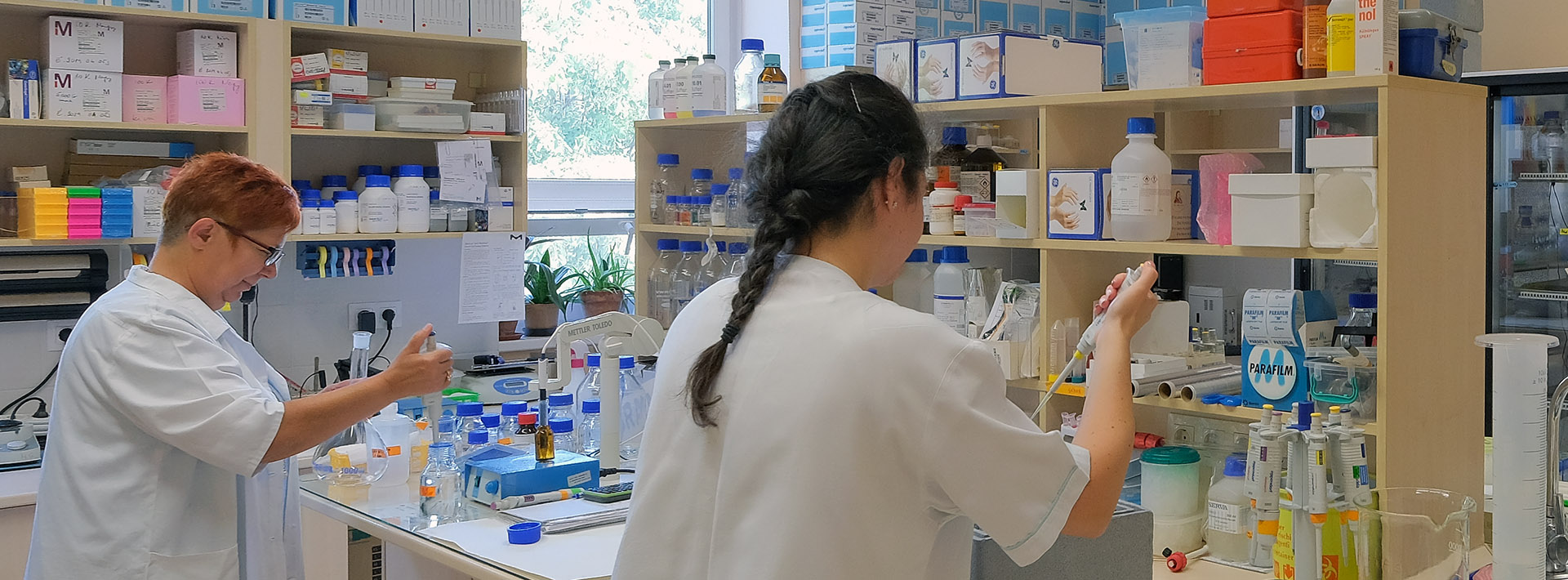Data
Official data in SubjectManager for the following academic year: 2024-2025
Course director
-
Ujfalusi Zoltán
assistant professor,
Department of Biophysics -
Number of hours/semester
lectures: 28 hours
practices: 0 hours
seminars: 0 hours
total of: 28 hours
Subject data
- Code of subject: OBA-106-E
- 2 kredit
- Biotechnology MSc
- Basic modul
- autumn
-
Course headcount limitations
min. 5 – max. 100
Topic
The Biophysics curse aims to introduce students to the methods and applications, that are routinely used in both medical and pharmaceutical biotechnology. The principles of the state-of-the-art approaches and instrumentations are covered by the topics. The course presents diverse spectroscopic techniques (absorption, fluorescence, infrared, Raman, EPR, NMR), imaging approaches (light and fluorescence microscopy, EM, super-resolution fluorescence microscopy, MRI, CT), radioactive applications, calorimetry, and fast kinetics techniques. The lectures discuss in detail the physical bases and principles of each approach and the field of applications. The practices are dedicated to extending the students' knowledge and routine with the use of different techniques. The practices lay special emphasis on presenting not only the routine applications but advanced uses of each technique. The limitations, as well as the artifacts that can be caused by improper experimental planning, are highlighted.
Lectures
- 1.
Introduction. Structure of the atom, structure of the atomic nucleus, quantum mechanical model of the atom. Molecular orbitals, LCAO (linear combination of atomic orbitals), energy levels (Jabłonski).
- Ujfalusi Zoltán - 2.
Introduction. Structure of the atom, structure of the atomic nucleus, quantum mechanical model of the atom. Molecular orbitals, LCAO (linear combination of atomic orbitals), energy levels (Jabłonski).
- Ujfalusi Zoltán - 3.
Electromagnetic waves, the electromagnetic spectrum. The wave and particle nature of light.
- Grama László - 4.
Electromagnetic waves, the electromagnetic spectrum. The wave and particle nature of light.
- Grama László - 5.
Protein Structure. Introduction to protein engineering.
- Fekete Zsuzsanna - 6.
Protein Structure. Introduction to protein engineering.
- Fekete Zsuzsanna - 7.
Analytical separation techniques: chromatography, sedimentation, electrophoresis. Mass spectrometry.
- Takács-Kollár Veronika Tünde - 8.
Analytical separation techniques: chromatography, sedimentation, electrophoresis. Mass spectrometry.
- Takács-Kollár Veronika Tünde - 9.
Basics of light microscopy. Fluorescence microscopy, FRAP.
- Huberné Barkó Szilvia - 10.
Basics of light microscopy. Fluorescence microscopy, FRAP.
- Huberné Barkó Szilvia - 11.
Modern microscopic methods (STORM, STED, SIM, confocal, 2-photon).
- Szabó-Meleg Edina - 12.
Modern microscopic methods (STORM, STED, SIM, confocal, 2-photon).
- Szabó-Meleg Edina - 13.
High resolution structural approaches 1. Generation of X-ray, X-ray crystallography.
- Kapetanaki Sofia Maria - 14.
High resolution structural approaches 2. SAXS, EM, cryo-EM.
- Kapetanaki Sofia Maria - 15.
Infrared and Raman spectroscopy.
- Lukács András Szilárd - 16.
Infrared and Raman spectroscopy.
- Lukács András Szilárd - 17.
UV-VIS spectroscopy, absorption photometry. Fluorescence spectroscopy, Förster-type resonance energy transfer (FRET); Quenching, Rapid kinetic methods.
- Huberné Barkó Szilvia - 18.
UV-VIS spectroscopy, absorption photometry. Fluorescence spectroscopy, Förster-type resonance energy transfer (FRET); Quenching, Rapid kinetic methods.
- Huberné Barkó Szilvia - 19.
Thermodynamics, thermal analysis; Calorimetric methods: differential scanning calorimetry (DSC), isothermal titration calorimetry (ITC).
- Lukács András Szilárd - 20.
Thermodynamics, thermal analysis; Calorimetric methods: differential scanning calorimetry (DSC), isothermal titration calorimetry (ITC).
- Lukács András Szilárd - 21.
Fluid flow, LASER, Flow cytometry. Fluorescence activated cell sorting (FACS).
- Grama László - 22.
Fluid flow, LASER, Flow cytometry. Fluorescence activated cell sorting (FACS).
- Grama László - 23.
Spin. Electron spin resonance (ESR), nuclear paramagnetic resonance (NMR) spectroscopy.
- Grama László - 24.
Spin. Electron spin resonance (ESR), nuclear paramagnetic resonance (NMR) spectroscopy.
- Grama László - 25.
Medical imaging techniques in diagnostics 1. Positron emission tomography (PET), magnetic resonance imaging (MRI).
- Bukovics Péter - 26.
Medical imaging techniques in diagnostics 1. Positron emission tomography (PET), magnetic resonance imaging (MRI).
- Bukovics Péter - 27.
Medical imaging techniques in diagnostics 2. Gamma-camera, X-ray, computed tomography (CT), single-photon emission computed tomography (SPECT).
- Ujfalusi Zoltán - 28.
Medical imaging techniques in diagnostics 2. Gamma-camera, X-ray, computed tomography (CT), single-photon emission computed tomography (SPECT).
- Ujfalusi Zoltán
Practices
Seminars
Reading material
Obligatory literature
Literature developed by the Department
All handouts and other related materials can be found in the Microsoft Teams group of the course.
Notes
Recommended literature
Conditions for acceptance of the semester
There are no additional conditions.
Mid-term exams
Theory exams are scheduled in the exam period according to the rules of studies and examinations.
Making up for missed classes
The opportunity to make up for absence is not provided.
Exam topics/questions
Topics of the exam questions:
Electromagnetic waves
Quantum numbers, NMR, MRI
Energy levels of atoms and molecules
Protein Structure. Introduction to protein engineering.
UV-VIS absorption spectroscopy
Fluorescence spectroscopy
Infrared and Raman spectroscopy
Flow cytometry
Light and fluorescence microscopy
Modern microscopic methods (STORM, STED, SIM, confocal, 2-photon)
Image analysis
Gamma camera, computed tomography (CT), single-photon emission computed tomography (SPECT), positron emission tomography (PET)
Radioactivity, the interaction of radioactive radiations with matter
Biological effects of radioactive radiations, dosimetry
X-ray crystallography, SAXS, EM
Thermodynamics: laws and thermodynamic potentials
Calorimetry: differential scanning calorimetry (DSC), isothermal titration calorimetry (ITC)
Analytical separation techniques: sedimentation, electrophoresis
Analytical separation techniques: chromatographic techniques
Mass spectrometry
Examiners
- Bukovics Péter
- Fekete Zsuzsanna
- Grama László
- Huberné Barkó Szilvia
- Kapetanaki Sofia Maria
- Lukács András Szilárd
- Szabó-Meleg Edina
- Takács-Kollár Veronika Tünde
- Ujfalusi Zoltán
